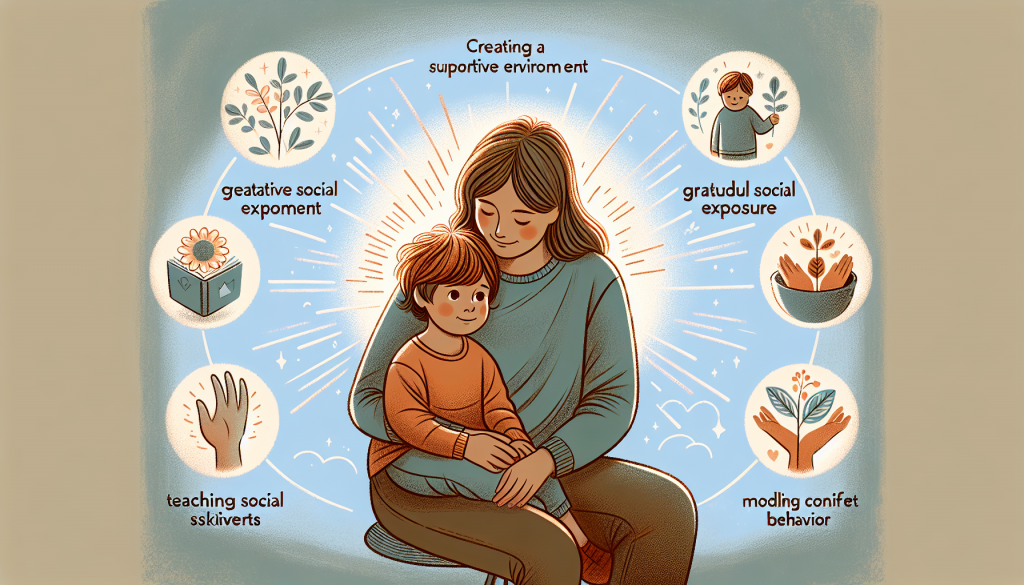“`html
How to Help Your Child Overcome Shyness
Introduction: Understanding Shyness in Children
Does your child struggle to speak up in group settings or hesitate to make new friends? Shyness is a common trait among children, but for some, it can become a barrier to developing social skills and building self-confidence. As parents, it’s natural to worry about how this might affect your child’s ability to thrive in social and academic environments.
Shyness is not necessarily a bad thing. It’s a personality trait that reflects a child’s cautious approach to new situations. However, when it limits opportunities for self-expression and connections with others, it’s important to step in and help. This article will guide you through effective strategies for overcoming shyness in children, helping them embrace their individuality while building confidence in social interactions.
Main Points: Why Some Children Are Shy
Shyness can stem from various factors, including temperament, environment, and experiences. Understanding the root cause of your child’s shyness can help you better address their needs. Here are some common reasons why children might be shy:
- Temperament: Some children are naturally more introverted or sensitive. This is often a result of their genetic makeup.
- Past experiences: Negative social experiences, such as teasing or rejection, can make children hesitant to engage with others.
- Fear of judgment: Many shy children worry about being judged or making mistakes in front of others.
- Parental influence: Overprotective parenting or modeling shy behavior can unintentionally reinforce shyness in children.
It’s important to note that shyness is not a flaw. Rather, it’s a sign that your child might need extra support to feel safe and confident in social situations. Addressing their psychological needs, such as the need for autonomy and self-expression, is key to helping them thrive.
Practical Recommendations: How Parents Can Help
Helping your child overcome shyness requires patience, understanding, and a proactive approach. Here are some practical parenting tips to help your child build confidence and improve their social skills:
1. Create a Safe and Supportive Environment
Shy children often feel vulnerable in unfamiliar settings. Create an environment where they feel safe to express themselves without fear of judgment. Encourage open communication at home and validate their feelings by saying things like, “It’s okay to feel nervous. Everyone feels that way sometimes.”
2. Encourage Gradual Social Exposure
Instead of pushing your child into large group settings, start small. Arrange playdates with one or two friends or involve them in structured activities like art classes or sports. Gradual exposure helps them build confidence in a less intimidating environment.
3. Teach Social Skills
Role-playing can be a fun and effective way to teach your child how to navigate social situations. Practice introducing themselves, starting conversations, or responding to common questions. Focus on positive reinforcement and celebrate their efforts, no matter how small.
4. Model Confident Behavior
Children learn by observing their parents. Show them how to approach new situations with confidence by modeling friendly and open behavior. For example, greet neighbors with a smile or strike up conversations in social settings to demonstrate that interacting with others can be enjoyable.
5. Avoid Labels
Refrain from labeling your child as “shy” in front of others. Labels can reinforce their hesitancy and make them feel like their shyness is a permanent trait. Instead, focus on their positive qualities, such as being thoughtful or observant.
6. Encourage Independence
Giving your child opportunities to make decisions and solve problems on their own fosters a sense of autonomy. Let them order their food at a restaurant or ask for help in a store. These small steps can help them feel more confident in their abilities.
7. Set Realistic Goals
Overcoming shyness is a gradual process. Set small, achievable goals for your child, such as saying “hello” to a classmate or raising their hand in class. Celebrate their progress to build momentum and reinforce positive behavior.
8. Seek Professional Support if Needed
If your child’s shyness significantly impacts their daily life, consider seeking help from a child psychologist or therapist. Professionals trained in cognitive-behavioral therapy (CBT) can provide tailored strategies to help your child build confidence and navigate social challenges.
Conclusion: Building Confidence for a Brighter Future
Shyness is a natural part of many children’s personalities, but it doesn’t have to hold them back. By understanding the root causes of their shyness and implementing practical strategies, parents can help their children develop the social skills and confidence they need to thrive.
Remember, progress takes time, and every child is unique. Celebrate their victories, no matter how small, and continue to provide a supportive environment where they feel safe to grow. With your guidance and encouragement, your child can overcome shyness and build a fulfilling and socially connected life.
“`

